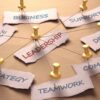Admit it — the title is a bit cryptic. But after some analysis it makes sense. Astute business leaders are now making sense of Emotional Intelligence and its application in the workplace. Research is making a “hard case” for soft skills. Emotional competencies are viewed by researchers to be twice important in contributing to organizational excellence as pure intellect and expertise.
Stop and consider the reality of our world today. More and more of our logical, linear and computer like skills are either being replaced with more sophisticated software modules or the skills are contracted overseas for a fraction of the cost. We are now in an emergent economy according to one author listed on the New York’s bestseller list. We are moving from the Information Age into the Conceptual Age – The New Frontier. This movement is also exacerbated with the demographic transition now in place. The skills of the past will be replaced with the skills of the future, where conceptual interpretations, relationships, pattern recognition, meaning, diversity and team are significant. We are in need of emergent human relation practices to provide us with a leadership edge. Emotional competence is becoming central to leadership, organizational competitiveness and sustainability.
Why should we care about emotional intelligence? What is the relationship between emotional intelligence and leadership? Research support linkages between emotional competencies and improvements in:
- Employee recruitment and retention
- Motivation
- Development of team
- Innovation
- Customer loyalty
- Increases in production and profitability
- Employee engagement
- Collaboration
What does the research tell us? Researchers looked at competency models for 181 positions across 121 companies and organizations world wide. It found that 67% of all abilities deemed essential for effective performance were emotional competencies compared to IQ and technical expertise. In addition, compared with IQ and expertise, emotional competence mattered twice as much. Research also supports that at the top executive levels close to 90% of executive success in leadership was attributable to emotional intelligence. – Daniel Goleman, Working with Emotional Intelligence.
Emotional intelligence starts with our personal self-awareness. Accurate self-assessment tools have been developed to measure our EQ – Emotional Quotient. A particular tool, EQ in Action, measures our ability to self-reflect, empathize and self-regulate; all key components to a healthy EQ. The tool sheds perspectives on how we experience ourselves and others in stressful situations.
Why is self-assessment and measurement essential?It allows us to establish a benchmark for our development as leaders. Emotional intelligence can be developed with exercises, reflection and practice. We firmly believe that before we can lead others, before we can help others, we must discover ourselves. In doing this we can change our leadership behaviors to enlist, mobilize, and empower those around us.
Can we agree on the following organizational challenges?
- People need to be more creative to drive innovation.
- More is expected from people with fewer organizational resources.
- Organizations must make better use of the special talents available in the diverse workforce.
- People need to collaborate more.
- Organizations must increase customer loyalty.
- Attracting and retaining quality talent is paramount to organizational success.
EQ not only provides the critical linkage to overcome these challenges listed above but it provides a tremendous opportunity for bettering self and the betterment of the organizations we lead. Leaders must understand that research is making a “hard case” for soft skills. Emotional competencies are viewed by researchers to be twice important in contributing to organizational excellence as pure intellect and expertise.







